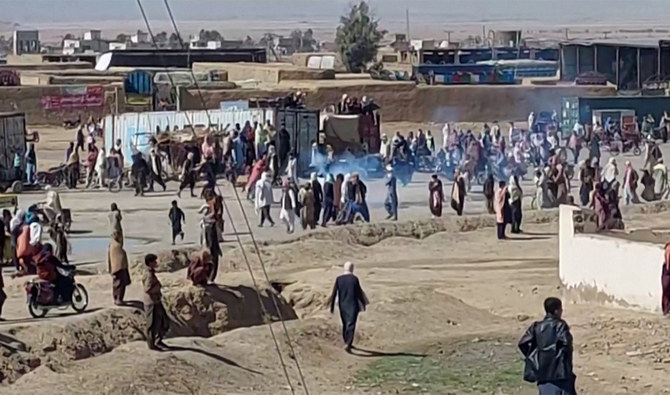ISLAMABAD: Pakistan border guards used tear gas Tuesday to disperse hundreds of people protesting against the implementation of a visa and passport regime for travel through a main border crossing with Afghanistan.
Protesters have been camped near the Chaman border crossing in the southwestern Balochistan province since October last year when Pakistan announced it would expel all illegal foreigners, mostly Afghans, from Nov. 1, and enforce strict immigration-related restrictions on border crossings, making the possession of valid passports and visas a requirement for travel. The “one document regime” replaced the decades-old practice of granting special travel permits to individuals from divided tribes straddling the nearly 2,600-kilometer border between the two countries.
“There was an operation against the protesters in the afternoon [Tuesday],” a Pakistani laborer, Grann, said in Pashto. “So, we have all gathered here and are throwing stones at the fortress [check post].”
Video footage widely shared on mainstream and social media showed tear gas in the air and hundreds of protesters near the border.
Graan said the protests were being held against the requirement for passports at Chaman, a main crossing for travelers and goods between Pakistan and landlocked Afghanistan. The other major crossing is at Torkham in the northwest.
“We want to be allowed to come and go freely,” Graan said. “The border has been sealed for 4 months and 10 days. We have nothing left to eat. There is no oil or flour in our homes, and they [Pakistan government] are saying they will only accept passports. We are helpless.”
The expulsion drive was launched amid a row with Kabul over charges that it harbors anti-Pakistan militants, which the Taliban government denies.
Until November last year, Pakistan was home to over 4 million Afghan migrants and refugees, about 1.7 million of them undocumented. Many came after the Taliban retook Afghanistan in 2021, and a large number have been present since the 1979 Soviet invasion. Islamabad says it is battling economic and security crises and can no longer host thousands of Afghans.
Thousands of tribespeople used to travel through the Chaman border crossing daily for work or to meet family members on the other side. They would use a slip of paper, locally called tazkira, granted to them under easement rights that guaranteed free travel.
Since the expulsion drive began, local tribesmen, laborers and traders have been protesting daily at the Chaman border, saying the new policy has disrupted cross-border economic activity and led to unemployment.
“We have nothing to eat, we are surviving on loans,” another protester, Abdul Rasheed, said. “Now we have reached a stage where we are giving water to our infants instead of milk … The Friendship Gate [between Pakistan and Afghanistan] should kindly be opened.”
According to government data, 493,648 Afghans have been repatriated since the expulsion policy began in Nov. 1 last year.
With input from Reuters
















